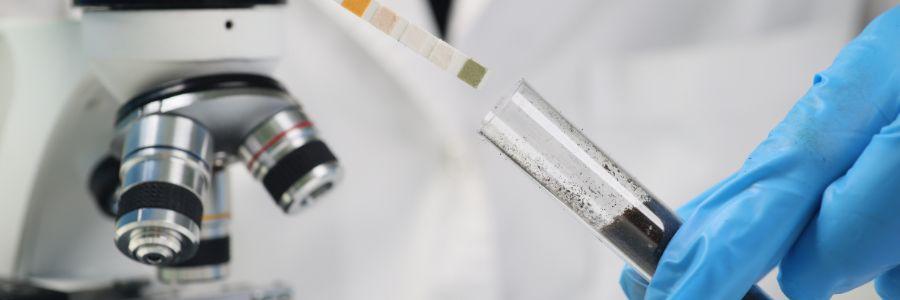Physical Properties Testing
By Kate Hatherley, C.TECH., LABORATORY TECHNICAL SPECIALIST, email
Physical properties testing is essential to ensure the quality, safety and compliance of your products. Dell Tech’s chemical lab testing services includes a wide range of physical properties tests that provide valuable insights into the characteristics of your materials and products.
In this guide, we will explore the physical properties tests we offer, their significance, and how they contribute to the overall assessment of your products.
To get started, let’s take a look at the definition of physical properties and the role of qualitative observations in their testing.
What is a Physical Property?
What is a physical property? Let’s start here. A physical property is a characteristic or attribute of a material or substance that can be observed or measured without changing the substance’s chemical composition or identity. Physical properties examination provides information about the material’s behavior under various conditions. It helps researchers, manufacturers, etc. to classify, describe, and understand different substances.
Qualitative Observations in Physical Properties Testing
Qualitative observations play a crucial role in understanding the visual aspects of materials and products. While qualitative observations are not standalone tests, they provide essential context. This compliments other testing results.
At Dell Tech, we include detailed qualitative observations in all of our test reports. Example of qualitative observations are:
- Color;
- Texture;
- Miscibility; and
- Other attributes that can be used to identify specifications of your products.
The Tests We Offer
Here is our guide to physical properties testing at Dell Tech. Continue reading for a description of the following test methods:
- Specific Gravity Testing
- Flash Point Testing
- Viscosity Testing
- pH Testing
- Acid/Alkali Reserve Testing
- Cloud Point Testing
- Stability Testing Over Time
For more information on any of these test methods or to get a quote for your project, contact our team.
Specific Gravity Testing
Specific gravity is the ratio of the density of a substance to the density of a reference substance (usually water). This test helps determine the relative density of a material. This is vital for understanding a material’s composition and behavior.
Specific gravity testing is used in many industries, including chemicals, pharmaceuticals and cosmetics, to ensure consistency, identify impurities, and monitor the production process.
Flash Point Testing
Flash point is the lowest temperature at which a substance emits sufficient vapor to form an ignitable mixture with air. This test is crucial for assessing the potential fire and explosion hazards of liquids, particularly volatile chemicals and solvents.
Dell Tech’s flash point testing helps you determine safe handling and storage procedures for your products, ensuring workplace safety and compliance with regulations. Learn more about the specific flash point methods we use, ASTM D56 and ASTM D93.
Viscosity Testing
How does viscosity testing contribute to product evaluation? Viscosity measures a fluid’s resistance to flow, providing insights into its consistency and texture. This test is essential for products such as coatings, adhesives, and food products, where proper viscosity ensures optimal performance.
Dell Tech’s viscosity testing helps you achieve the desired product consistency, ensuring that your materials meet functional requirements and provide a satisfying user experience.
Viscosity testing also informs hazard classification for aspiration hazards. Aspiration hazard refers to the potential for a substance to be inhaled into the respiratory system when ingested or brought into contact with the mouth or throat. It is a concern for products with low viscosity (thin liquids) that can easily enter the lungs if aspirated. Regulatory agencies may consider both viscosity and aspiration hazard potential when classifying and labelling hazardous substances. A substance with both low viscosity and a high risk of aspiration hazard may be classified as more hazardous. It would be subject to specific labelling and handling requirements.
pH Testing
pH measures the acidity or alkalinity of a solution. It is a critical parameter for a wide range of products, from personal care items to industrial chemicals. pH testing helps determine product stability, compatibility, and potential reactivity with other substances.
Dell Tech’s pH testing services assist you in maintaining consistent product quality and safety while meeting regulatory standards.
Acid/Alkali Reserve Testing
What is acid/alkali reserve testing, and when is it necessary? Acid/alkali reserve testing evaluates the ability of a material to neutralize acids or alkalis. This test is especially important for products that come into contact with other substances, such as cleaning agents and water treatment chemicals.
Dell Tech’s acid/alkali reserve testing helps you ensure that your products can maintain their intended functionality and effectiveness over time.
Regulatory requirements for acid or alkali reserve testing can vary depending on the industry, product type, and regional regulations. An example of acid/alkali reserve testing for regulatory compliance includes its use in CCCR 2001 as part of corrosive product hazard classification.
Cloud Point Testing
Cloud point testing is used to determine the temperature at which a liquid starts to form small, cloudy particles as a result of the separation of components that are less soluble at lower temperatures. Cloud point testing is particularly relevant for products such as cosmetics, petroleum-based fuels, lubricants, and certain industrial chemicals. Understanding the cloud point of a substance is crucial for predicting its performance under varying temperature conditions.
At Dell Tech, we offer cloud point testing as part of our physical properties testing services. Our testing provides you with valuable insights into the behavior of your products across different temperature ranges and enabling you to make informed decisions about a product’s formulation and application.
Stability Testing Over Time
Stability testing is a fundamental component of ensuring the quality and reliability of consumer and workplace chemical products. In the realm of consumer and workplace chemicals, which include cleaning agents, disinfectants, and industrial chemicals, stability testing plays a pivotal role in evaluating how these products withstand various environmental conditions over time.
Stability testing helps manufacturers understand how their formulations may change, degrade, or react when exposed to factors such as temperature fluctuations, humidity, light, and other stressors that may be encountered during storage, transportation, or everyday use.
Conclusion
Dell Tech’s physical properties testing services offer valuable insights into the characteristics of your materials and products. From qualitative observations to specific gravity, flash point, viscosity, pH, and acid/alkali reserve testing, we provide a thorough assessment to help you achieve product quality, safety, and compliance.
By leveraging our expertise, you can make informed decisions, enhance your products, and confidently bring them to market.
Contact Dell Tech today to learn more about how our physical properties testing services can benefit your business.







